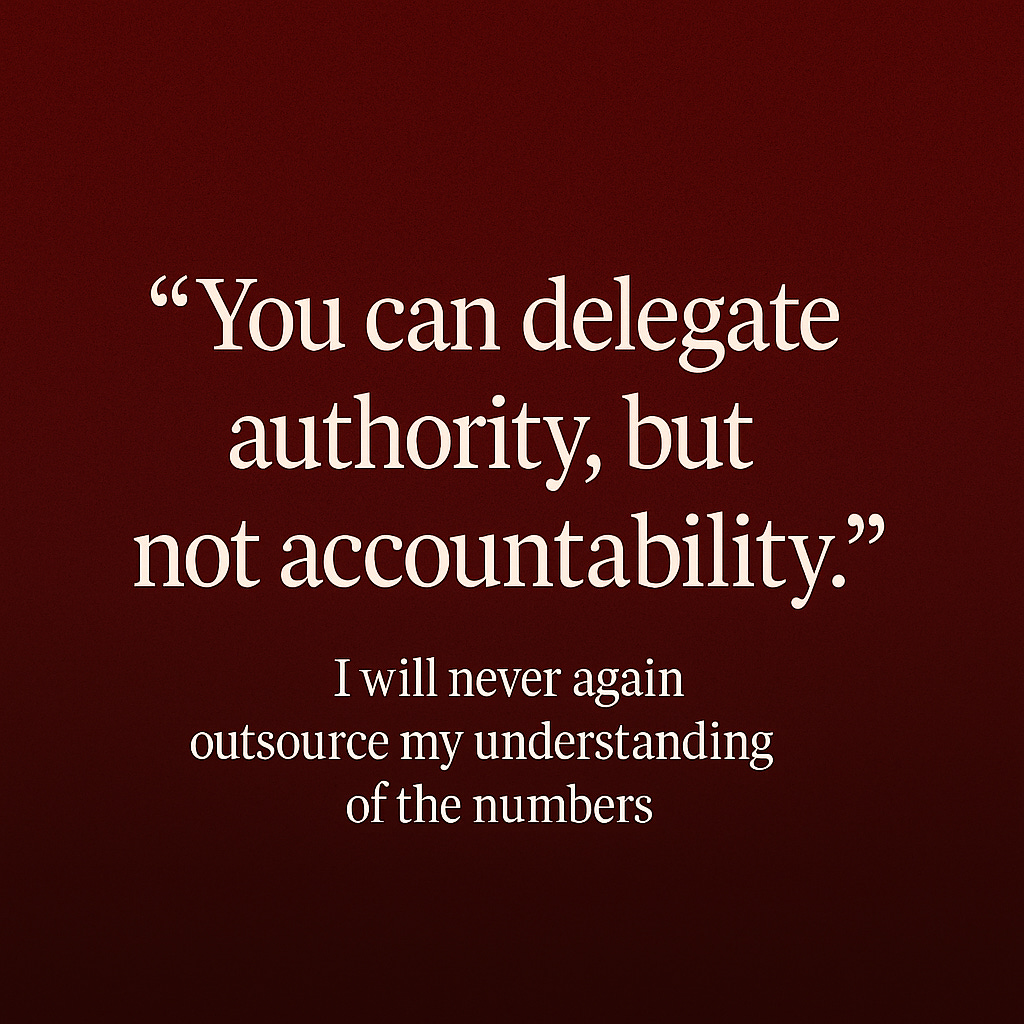Why I will Never Trust the Numbers Blindly Again
When payroll hit and cash was short, I learned the hard way what leadership really means.
In 1977, I bought a small aerospace manufacturing company that specialized in building illuminated cockpit panels.
I didn’t know what I didn’t know.
I knew how to lead, I knew how to work, and I believed in the power of surrounding myself with good people.
But the financial side of the business? I didn’t consider it my strength. So a few months in, I hired a Chief Financial Officer with the background and numbers acumen I lacked to help steer the ship.
He seemed competent. Calm. He handed me the financial reports, answered my questions, and provided enough information to make me feel like things were going well.
But after several weeks, something felt off. Not “fire-alarm” off. Just that quiet nagging in the back of your mind, the one that you try to silence because it feels like paranoia.
Looking back, I ignored it.
Maybe I didn’t want to confront the reality that I didn’t fully understand what I was looking at. Maybe I assumed that “no news is good news.” Or maybe I was young and scared, not wanting to look stupid.
Then came another payroll week.
We had over 100 people on our payroll, engineers, machinists, and technicians, each one relying on our company to support them and their families.
On Monday, the CFO was heading out for vacation. As he packed up, I casually asked, “Do we need anything before you go?”
He looked up and said flatly, “We need money.”
Then he left.
That was it. No explanation. No urgency. Just “we need money.”
I should’ve stopped everything right then.
But I didn’t. I told myself he must have meant something minor, a timing issue, a billing lag. I convinced myself that if there were a serious problem, he would’ve raised the flag. That’s what I paid him for.
Then came Wednesday.
I was reviewing the numbers that evening. No big revelations, just more of that unease. I went to bed, still unsure, but at 3:00 a.m., I sat bolt upright, heart pounding. I knew.
Something was wrong. Deeply wrong.
At 8:00 a.m., I walked into our office and pulled aside our staff accountant. “Do we have enough money to make payroll tomorrow?” I asked.
She paused. Then answered softly, “No.”
No. One syllable. But it hit like a truck.
I stood there, stunned. Embarrassed. Ashamed. Angry.
How had I let this happen?
The worst part wasn’t that we were out of money. It was that I had no idea until that moment. I’d handed off responsibility, thinking I could delegate the hard stuff, the uncomfortable stuff, and still be a competent leader.
I wasn’t.
Reluctantly, I picked up the phone and called my financial partner. I had to explain that we were out of cash, that payroll was due tomorrow, and that I had failed to see it coming.
It was the most humiliating call I’ve ever made.
To his credit, he didn’t yell. He didn’t scold. He wired $500,000 that day and made sure we made payroll. His calmness made it worse somehow;, it showed just how unprepared I’d been.
The CFO? Fired!
And me? I made a quiet, permanent vow to myself:
I will never again outsource my understanding of the numbers.
Not because I had suddenly become a financial wizard. But because I had learned the cost of blind trust. You can delegate authority, but not accountability. If something goes wrong, no one’s looking to the CFO. They’re looking at you.
And rightly so.
What I Learned (the Hard Way)
Trust is not a substitute for oversight.
Trust your people, yes. But verify. Review. Ask questions. If you don’t understand something, stop and figure it out.Gut feelings matter.
That “off” feeling? That’s your experience whispering truths your brain hasn’t caught up to yet. Don’t ignore it. Especially not in business.Leadership means facing what’s uncomfortable.
Finances weren’t my strong suit. But the cost of avoiding them was nearly catastrophic. I didn’t need to become a CPA—but I needed to own the numbers.
It’s been decades since that 3:00 a.m. wake-up call. But I still think about it.
It’s the moment I truly became a business owner, not just someone who bought a company.
Because when you sign those checks, when people’s lives and livelihoods are tied to your leadership, you don’t get to look away.
You look closer.
Always.
If this resonated with you:
Forward it to a small business owner or startup founder who might need a reminder to know the numbers.
Or reply and share: What was your “3:00 a.m.” moment?
Let’s talk about it. These aren’t just business lessons—they’re life lessons.


